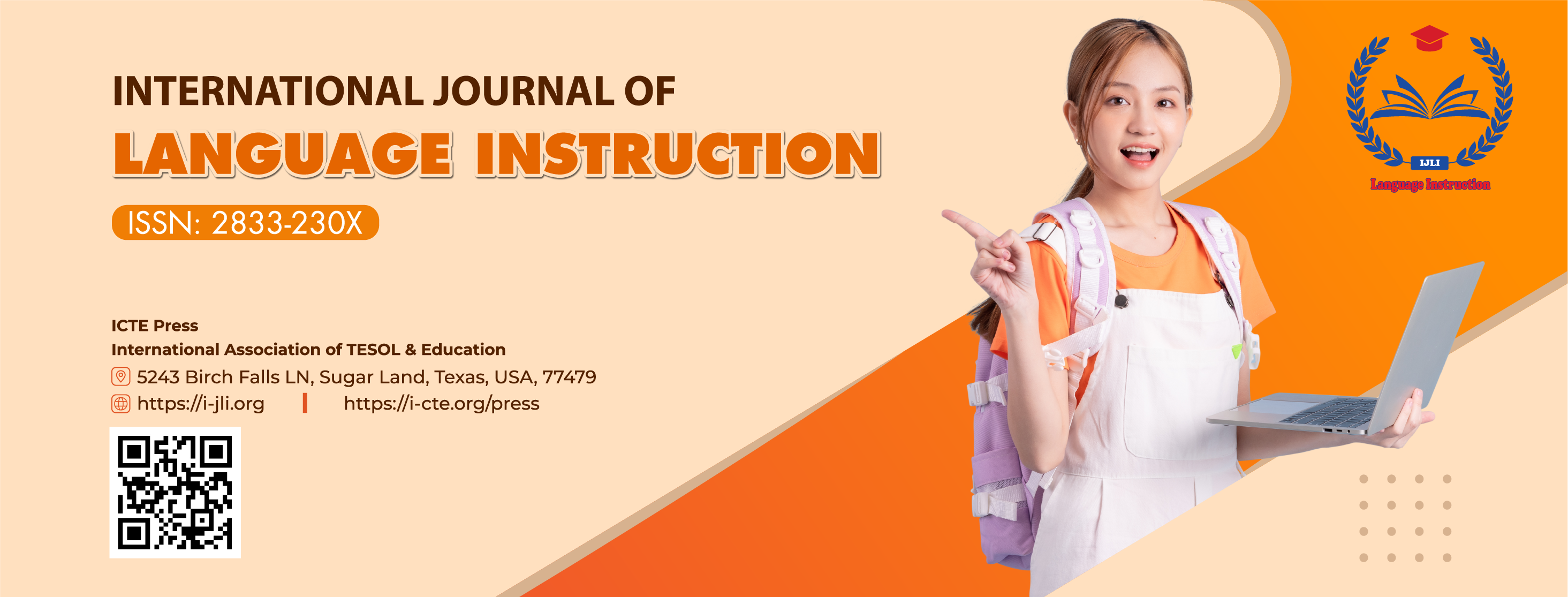The Impact of Online Resources via Personal Devices on English-Majored Students’ Learning Practices
DOI:
https://doi.org/10.54855/ijli.24346Keywords:
personal technological devices, reading practice, online resources, perception, effects/impactsAbstract
This study examines the role of online resources accessed through personal technological devices in the learning practice of English-majored students. Eighty students were involved in this investigation; the author used a qualitative approach to analyze students' weekly news reports and semi-structured interviews. The findings indicate that the students have consistently used their smartphones and laptops for reading practice due to their leveled news content. Students perceived this practice positively, acknowledging its benefits for learning vocabulary, developing reading skills, and enhancing background knowledge. They reported improved vocabulary acquisition through word family and collocation learning, enhanced reading speed through skimming, and increased knowledge of current affairs. The study highlights the advantages of this practice, such as portability, convenience, and resource availability, while acknowledging minor drawbacks like note-taking difficulties. Other recommendations are class discussions, bonus marks to motivate the students, discipline, reading of specific topics, and construction of online learning platforms. Generally, this paper indicates that online resources and PTDs shall be helpful in enhancing the actual practice of reading in English-majored students.
References
Alobaid, A. (2020). Smart multimedia learning of ICT: role and impact on language learners’ writing fluency—YouTube online English learning resources as an example. Smart Learning Environments, 7(1), 24. https://doi.org/10.1186/s40561-020-00134-7
Caskurlu, S., Richardson, J. C., Maeda, Y., & Kozan, K. (2021). The qualitative evidence behind the factors impacting online learning experiences as informed by the community of inquiry framework: A thematic synthesis. Computers & Education, 165, 104111. https://doi.org/10.1016/j.compedu.2020.104111
Dwivedi, Y. K., Ismagilova, E., Hughes, D. L., Carlson, J., Filieri, R., Jacobson, J., Jain, V., Karjaluoto, H., Kefi, H., & Krishen, A. S. (2021). Setting the future of digital and social media marketing research: Perspectives and research propositions. International journal of information management, 59, 102168. https://doi.org/10.1016/j.ijinfomgt.2020.102168
Indhiarti, T. R., & Sudarwati, E. (2021). An introduction to research methods in applied linguistics: A practical guide. Universitas Brawijaya Press.
Kaefer, T. (2020). When did you learn it? How background knowledge impacts attention and comprehension in read‐aloud activities. Reading Research Quarterly, 55, S173-S183.
Kazu, İ. Y., & Kuvvetli, M. (2023). A triangulation method on the effectiveness of digital game-based language learning for vocabulary acquisition. Education and Information Technologies, 28(10), 13541-13567.
Nabilla, A., & Asmara, C. H. (2022). The effect of SQ3R method on improving students’ reading skill. English Education Journal, 12(4), 510-525.
Nazari, M., Karimi, M. N., & De Costa, P. I. (2023). Emotion and identity construction in teachers of young learners of English: An ecological perspective. System, 112, 102972.
Ngo, T. C. T., & Doan, L. A. T. (2023). EFL Students’ Strategies for Learning Academic Vocabulary with Mobile Phones at Van Lang University in Vietnam. International Journal of Language Instruction, 2(4), 19–42. https://doi.org/10.54855/ijli.23242
Nguyễn Văn Long, & Nguyễn Nữ Thùy Uyên. (2021). Computer Assisted Language Learning: From Theory to Practice. Vietnam National University Press.
Özgür Küfi, E. (2023). Activation of Content-Schemata for Scaffolding L2 Writing: Voices from a Turkish Context. Journal of psycholinguistic research, 52(6), 2405-2427.
Quan, Z., Grant, L., Hocking, D., & Connor, A. (2024). Distinctive mobile learning: Where it is different and how it can make a difference. Interactive Learning Environments, 32(1), 257-272.
Sok, S., & Han, Z. (2020). A study of L2 vocabulary acquisition under incidental and intentional conditions. Vigo International Journal of Applied Linguistics(17), 113-140.
Sun, X. (2023). Differentiated instruction in L2 teaching: Two extensive reading programmes conducted during Covid-19 pandemic. Innovation in Language Learning and Teaching, 17(2), 177-190.
Thach, T. D. L. (2022). Teachers’ Perceptions of Comprehensible Input on English Vocabulary Acquisition. International Journal of Language Instruction, 1(1), 120–131. https://doi.org/10.54855/ijli.221110
Wijnands, A., Rijt, J. v., & Coppen, P.-A. (2021). Learning to think about language step by step: a pedagogical template for the development of cognitive and reflective thinking skills in L1 grammar education. Language Awareness, 30(4), 317-335.
Zang, S., & Shen, X. (2024). Impact of Mobile Learning on Self-Regulated Learning Abilities of Higher Education Students. International Journal of Interactive Mobile Technologies, 18(14).
Zhang, P. (2022). How does repetition affect vocabulary learning through listening to the teacher’s explicit instruction? The moderating role of listening proficiency and preexisting vocabulary knowledge. Language Teaching Research, 13621688221140521.
Downloads
Published
Issue
Section
License
Copyright (c) 2024 Nguyen Van Long

This work is licensed under a Creative Commons Attribution 4.0 International License.
The copyright of all articles published in the International Journal of Language Instruction (ijli) remains with the Authors, i.e. Authors retain full ownership of their article. Permitted third-party reuse of the open access articles is defined by the applicable Creative Commons (CC) end-user license which is accepted by the Authors upon submission of their paper. All articles in the ijli are published under the CC BY-NC 4.0 license, meaning that end users can freely share an article (i.e. copy and redistribute the material in any medium or format) and adapt it (i.e. remix, transform and build upon the material) on the condition that proper attribution is given (i.e. appropriate credit, a link to the applicable license and an indication if any changes were made; all in such a way that does not suggest that the licensor endorses the user or the use) and the material is only used for non-commercial purposes.
Authors are able to enter into separate, additional contractual arrangements for the non-exclusive distribution of the journal's published version of the work (e.g., post it to an institutional repository, in a journal or publish it in a book), with an acknowledgment of its initial publication in this journal.











